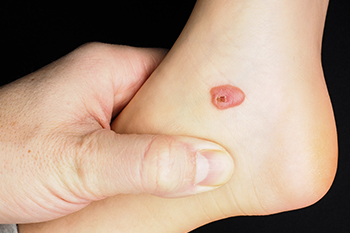
Foot blood blisters are small pockets of fluid that form between the layers of skin in response to friction or pressure. They typically occur when blood vessels near the skin's surface rupture, causing blood to pool within the blister. These blisters can vary in size and may appear red, purple, or even black due to the presence of blood. Common causes of foot blood blisters include wearing ill-fitting shoes that rub against the skin, excessive friction from activities such as running or hiking, and repetitive trauma to the feet. Additionally, certain foot deformities like bunions or hammertoes can predispose individuals to developing blood blisters. Athletes and individuals who spend prolonged periods on their feet are also at increased risk. Preventing foot blood blisters involves wearing properly fitted shoes, using protective padding or bandages on areas prone to friction, and gradually increasing activity levels to allow the skin to adapt. Proper foot care and attention to footwear can go a long way in reducing the likelihood of developing these painful blisters. If you have developed a blood blister on your foot, it is suggested that you visit a podiatrist who can inspect and treat this foot condition.
Blisters are prone to making everyday activities extremely uncomfortable. If your feet are hurting, contact Daniel Mendoza, DPM of Nashville Podiatry. Our doctor can provide the care you need to keep you pain-free and on your feet.
Foot Blisters
Foot blisters develop as a result of constantly wearing tight or ill-fitting footwear. This happens due to the constant rubbing from the shoe, which can often lead to pain.
What Are Foot Blisters?
A foot blister is a small fluid-filled pocket that forms on the upper-most layer of the skin. Blisters are filled with clear fluid and can lead to blood drainage or pus if the area becomes infected.
How Do Blisters Form?
Blisters on the feet are often the result of constant friction of skin and material, usually by shoe rubbing. Walking in sandals, boots, or shoes that don’t fit properly for long periods of time can result in a blister. Having consistent foot moisture and humidity can easily lead to blister formation.
Prevention & Treatment
It is important to properly care for the affected area in order to prevent infection and ease the pain. Do not lance the blister and use a Band-Aid to provide pain relief. Also, be sure to keep your feet dry and wear proper fitting shoes. If you see blood or pus in a blister, seek assistance from a podiatrist.
If you have any questions, please feel free to contact our office located in Hendersonville, TN . We offer the newest diagnostic and treatment technologies for all your foot care needs.
